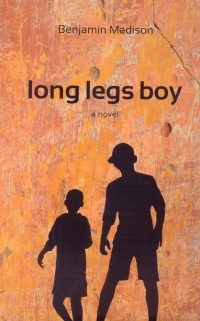| ________________
CM . . .
. Volume XIX Number 31. . . .April 12, 2013
excerpt:
Long Legs Boy contains intensely emotional topics such as prostitution, abuse, hunger, and police brutality, but it is told from an innocent boy's point of view, an approach which endears the reader to want to know more about this resilient long legs boy, Modou. He is also known as Toofas because of his ability to outrun the police and other intruders. His charisma and never-give-up attitude open the door for him to meet people and find ways to help them to make a living by his own hard work and survival and cooperative strategies. The book brings to light the inconsistencies between well-meaning social agency policies to help street children (closing the schools for orphans, making begging illegal) and the everyday fight to stay alive. At the end of each chapter, there is a news article that shows a strongly skewed perspective of what is happening to street children in the area, and how social policy is not working in their favor. This is a strong call to readers for advocacy and interventions to support street children in positive ways. One of the most touching parts of the book is the relationship between Moudu and Umaru, the younger boy that he has taken under his wing. Together, they must find a way to survive living on the street, find food and shelter, and stay safe from predators, other boys who want to take their food or shelter, and from the police who are constantly looking to take them and punish them for making their town look bad in the eyes of the tourists. They, too, are just trying to survive. Long Legs Boy is a great resource for ELA teachers, and students studying journalism, international development and world issues, regarding the issues of power in writing about developing countries,. Recommended. Stephanie Yamniuk is an instructor in the Faculties of Education and Human Ecology at the University of Manitoba, and she is completing her PhD on the resilience and lived experiences of refugee students and their families in Canadian schools.
To comment
on this title or this review, send mail to cm@umanitoba.ca.
Copyright © the Manitoba Library Association. Reproduction for personal
use is permitted only if this copyright notice is maintained. Any
other reproduction is prohibited without permission.
NEXT REVIEW |
TABLE OF CONTENTS FOR THIS ISSUE
- April 12, 2013
AUTHORS |
TITLES |
MEDIA REVIEWS |
PROFILES |
BACK ISSUES |
SEARCH |
CMARCHIVE |
HOME |
